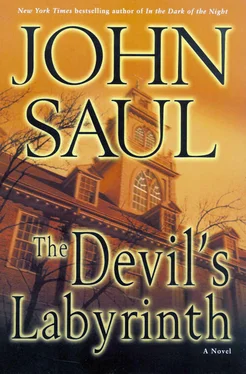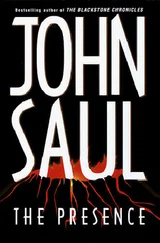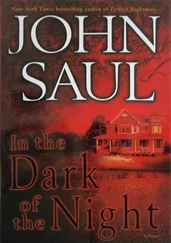“Thank you,” Thomas said softly. “And now you will go down to the office, where you will wait for me. I’ll be there at the end of the period, and you will be out of school for the rest of the year, even if we decide not to press charges, which I can assure you we won’t. You’re through, Alito.”
His face twisted with fury, Frankie Alito got to his feet, jabbing an elbow hard into Ryan’s shoulder.
“I saw that, too,” Mr. Thomas said. “You’re only making it worse.”
Alito shrugged and walked to the door, then paused before opening it. He turned his eyes, boring into Ryan, and then he smiled.
It was a smile that sank like a dart into Ryan’s belly.
“Okay. Show’s over,” Mr. Thomas said, breaking the uneasy silence that had fallen over the room. “Back to your tests. You have only ten minutes left.”
But for Ryan, the test was already over. He stared at the questions that still remained, reading them over and over again, but no matter how many times he read the words, he couldn’t make sense of them.
It wasn’t enough that he had to worry about his mother and Tom Kelly. Now he had to face Frankie Alito and his friends, who would no doubt jump him when he was on the way home after school.
He turned his head and looked out the window. In the distance, he could see the skyline of Boston, and though he was pretty sure it wasn’t really possible, he thought he could even pick out the spire on top of St. Isaac’s School.
The school his mother had talked about the last time he’d come home with a black eye after a run-in with Frankie Alito.
Except he was pretty sure it hadn’t been his mother’s idea at all. In fact, he’d have been willing to bet it had been Tom Kelly’s idea.
But now, as he stared at his unfinished test, and knew all he had to look forward to for the rest of the day was Frankie Alito’s fury, he began to wonder.
Surely St. Isaac’s couldn’t be any worse than where he was.
“Time’s up,” said Mr. Thomas.
BROTHER FRANCIS STOOD in the doorway of the vast dining room at St. Isaac’s Preparatory Academy, scanning the tables of students, searching for Kip Adamson. At least half the school’s two hundred students were sitting at the long tables eating, talking, and laughing, yet despite the noise they were generating, the chamber was still far quieter than had been the much smaller cafeteria at the school Brother Francis had left only last fall. Indeed, it seemed to him as if the old stone building housing the dining hall was somehow offended by the noise, and, rather than tolerate such frivolity within its walls, had somehow found a way to absorb the noise the school’s students made, muting it almost as quickly as the students generated it.
Though he was new to St. Isaac’s, Brother Francis had a knack for attaching names to faces, and now he was able to greet nearly every one of the students by name as he walked between tables in search of one particular face. Kip Adamson, though, was nowhere to be seen; he’d already missed his senior math class, and Sister Mary David had sent Brother Francis to find out why. Sister Mary David’s wrath was legendary; not only would nobody willingly miss her class without an ironclad excuse, but she wouldn’t hesitate to vent her fury upon Brother Francis, should he prove unable to explain young Adamson’s absence.
Kip must have had a good reason — at least, he’d better have had a good reason.
In the far corner of the dining hall, Brother Francis spotted Clay Matthews, Kip’s roommate, sitting with his usual group of friends. As Brother Francis approached, he caught a glimpse of playing cards, and suddenly knew why they were all knotted up in the corner together.
“Hey, Brother Francis,” Tim Kennedy said loudly enough that the young cleric was sure it was meant as a warning to Tim’s friends rather than a greeting to himself. Sure enough, the other boys’ heads snapped up the instant Tim spoke.
Brother Francis put on his sternest face. “I believe you’re all aware that gambling is against the rules,” he said. The boys glanced at each other uneasily. “Think what would have happened if it had been Sister Mary David who caught you instead of me.”
As the rest of the boys paled slightly, José Alvarez did his best to look utterly innocent. “Gambling?” he asked, as if Brother Francis had spoken in some exotic language he didn’t quite understand.
“We’re just playing Crazy Eights,” Darren Bender said.
“I see.” Brother Francis held his hand out for the cards. Clay Matthews groaned, squared the cards into a deck and surrendered them to Brother Francis, who slipped them into one of the deep pockets in his cassock. “Have any of you seen Kip?” he went on. “He missed his math class.”
The boys shook their heads. “He might still be in bed,” Clay said. “I don’t think he’s been feeling good.”
Brother Francis frowned, his lips pursing. “Oh? Did he go to the infirmary?”
Clay shrugged. “It wasn’t like he was sick with the flu or anything. He’s just been acting kind of strange for a while.”
“Strange how?” Brother Francis asked, though he was fairly sure that whatever answer he got wouldn’t be particularly enlightening. Sure enough, Clay only shrugged again. “Okay,” Brother Francis sighed. “I’ll check around. Meanwhile, if you see him, have him come to my office.”
Leaving the dining hall, Brother Francis began making his way through the maze of hallways and short flights of steps that connected all the various buildings into which the school had spread over the century it had been on Beacon Hill. Even after eight months, Brother Francis was still finding areas he couldn’t remember ever seeing before. There were offices and classrooms spread through dozens of buildings, not to mention the dormitories for the students and the residences of the staff. The students all seemed to know the sprawling old buildings better than he did, and had found shortcuts he knew nothing about. Still, now he was at least able to find his way from the dining room to the boys’ dorm without getting lost.
At least not too lost.
He knocked on the door of room 231, but there was no answer. “Kip?” he asked, then knocked again before turning the knob and entering.
The room was kept as neatly as the school demanded, with both beds made. The items on the desks were orderly, the closet doors were closed, and the dresser top clear.
But no sign of Kip; no clue at all as to his whereabouts.
Brother Francis used his cell phone to call the infirmary, rather than walking all the way over to the other side of the school, but the nun on duty told him that Kip hadn’t been there, either.
As he pocketed the phone, worry began to gnaw at his gut.
He moved to the window, looking down over Beacon Hill. From where he stood the view was unobstructed all the way to the Charles River, and Cambridge beyond. Idly, he wondered what the Puritan founders of the city would think about a Catholic school sitting atop their finest hill, the gothic architecture and spires of the school’s original building towering over the lower structures that some of those Puritans had built themselves.
Turning away from the view beyond the school, Brother Francis glanced once more around the room, but nothing had changed.
Kip had not miraculously reappeared.
Not that Brother Francis had really expected him to, given that the student population of the school had a disproportionate number of high-risk kids, one of whom was none other than Kip Adamson.
The odds were that Kip had just taken off. Brother Francis had been warned that it happened; indeed it had happened once before this very school year.
Читать дальше












